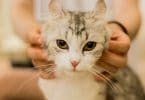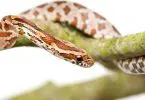If you are getting confused between deciding which dog breed you should buy, a golden retriever (loveable and active breed), or a poodle (who doesn’t shed), you have a great choice to buy Goldendoodle, which is an adorable mix of these two breeds. The hybrid is a “designer breed” because they have all the fantastic qualities of both parents. If you have decided to buy a Goldendoodle, there will be many questions in your mind. One of them will be “is Goldendoodle hypoallergenic or not”? All you need to do is a little bit of research, and casual detective work to assess the dog and the breeder. You have to keep one thing in your mind that no dog is 100% hypoallergenic, but the dog you are planning to buy is more hypoallergenic than most of the other dogs due to their inheritance from non-shedding poodles.
Table of Contents
What Does Hypoallergenic Mean?
The Greek word “hypo” means “under or beneath,” synonyms of which are “fewer or less,” and allergenic means “causing an allergic reaction.” Therefore, a hypoallergenic dog means a dog that is very unlikely to trigger an allergic reaction in the body. People think that this allergy begins with a dog’s hair or fur, but the reality is different. These allergy-causing dogs have particular kinds of protein (can f1) present in their saliva and urine that stick to the dander (dried flakes) present on the dog’s body. When a dog sheds its fur, the dander automatically falls off, and the allergy-inducing protein spreads in the air. Thus we can say that no-shedding and hypoallergenic are the same things. Hypoallergenic dogs usually have long hair that doesn’t shed.
Do Goldendoodle Shed?
There is usually a high possibility that a Goldendoodle will shed less than any other dog. Even though this crossbreed has bred from a golden retriever that is typically heavy shedders and poodles that are usually non-shedding, the Goldendoodle is known to shed slightly. The severity depends upon which parent dog your puppy most favors (Golden retriever or poodle). You can realize the influence of each parent dog by knowing the type of coat they have.
Goldendoodle Coat Type
A golden doodle (of any generation) comes with three types of fur coats.
Long Or Short Coat
The gene that decides the length of the coat is called “FGF5”. The short one mostly occurs in earlier generations of Goldendoodle, for example (F1, F1b). The majority of this breed grows up to be long-coated.
Loose Wavy/Shaggy
This coat type is present in breeding like F1, F2, and F2b that are the English Goldendoodle breed. This coat type usually has low, moderate shedding.
Curly Coats
F1B and F3 are the breeding that most frequently have curly coats. The curly-coating of English Goldendoodle in F1, F2, and F2b generations are known to be the most non-shedding do
Coat Type | Generation | Shedding |
Long/short coats | FGF5 | Less shedding |
Wavy/shaggy (fleece coat) | All types | Low to non-shedding |
Curly coats | Mostly in F1B | Non-shedding |
Most Hypoallergenic Goldendoodle Generations
Generation | Poodle% | Retriever% | Shedding% |
F1B | 75% | 25% | 50% non-shedding 50% shedding |
F1BB | 87.5% | 12.5% | 25%non-shedding 50% low-heavy shedding 25% fully-shedding |
F2B | 62.5% | 37.5% | 25-50% low-heavy shedding 50% odds |
F2BB | 81.25% | 18.75% | 25-50% low-heavy shedding 50% odds |
F3 | backcrossed | Multi-generation | 0% shedding |
Is Goldendoodle More Hypoallergenic Than Any Other Dog?
Indeed, a Goldendoodle is more hypoallergenic than most of the other dogs. We can’t say that all the generations of this breed are 100% hypoallergenic, but yes, studies have proven that the multi-generation (F3) crossbreeds are best for the people who are more likely to induce allergy. The intensity of the allergic reaction varies from dog to dog, so you should perform testing before buying a Goldendoodle.
Choosing A Goldendoodle Breeder
These tips will help you choose the right breed.
- You can conveniently get your cross-bred dog at your local shelter.
- Health testing is necessary to determine the presence of any genetic disorder.
- Online shopping doesn’t always associate with creditable breeders.
- Research and investigation before buying, lead to choosing the best puppy.
- The price of the puppy varies from breed to breed, depending on the various factors.
- Knowledge of available rescue organizations, best veterinarians, and vaccination centers is necessary.
Reasons To Choose Goldendoodle Among Allergy Sufferers
- They are hypoallergenic but with a variety of beautiful, soft coats. You can pick any size (large, medium, or small) according to your preference.
- They are very active and intelligent; thus, easy to train. You can easily teach new and technology-based tricks to them. Allergy-causing proteins are present in the dog’s urine, tears, and saliva. If you teach them to do the washroom on command, these allergies will be minimized.
- They are a perfect family pet, from babies to teens, they can easily bond with them because they are very friendly by nature.
Goldendoodles And Allergies – What Should I Do?
If you or your family has allergies, the first generation (F1) breeds are not suitable for you as there are 50% chances of triggering allergic reactions. One thing to keep in mind is that not all the dogs shed after the same period. Some dogs shed every 4-5 days while some other breeds like poodles, Airedales shed after 20 to 25 days. They are unlikely to initiate allergies. The Doodles that have non-shedding coats have usually been produced in new generations by breeding the first-generation Doodle back to a purebred poodle. This beautiful breeding combination results in 75% poodle/25% retriever and creates a variety of coats that are more likely to be non-shedding.
A dog from an F1b generation would have more chance to be a candidate for an allergy sufferer’s. You should spend some time with the dog before bringing it home. In this way, you will know the type and intensity of any kind of allergies. Some breeders offer a specific kind of test “T-shirt allergy test” that helps you to know that your chosen puppy will not cause an allergic reaction. You can find a local doodle event where you can join the get-togethers and chance to spend time with different types of dogs. These visits will give you an idea about the possible allergic reaction you may have when you get that breed to your home.
Ways To Reduce The Risk Of Allergic Reactions From Your Puppy.
Washing
Washing or bathing your dog will undoubtedly reduce the amount of dander falling from their coats. You can also buy good quality shampoo and shed control cleanser. These products will soften the dog’s skin and prevent dryness. You should wash your puppy at least twice per month.
Cleaning Your Home
Keeping a pet dog is not an easy job. You have to make habits to keep your house clean regularly if you want to prevent yourself from allergies. You have to vacuum the carpets and floor to collect all the dander that has already fallen off from your pet’s body.
Brushing
Since dander is present in your dog’s coat, you should brush your dog more often. Brushing is an essential step to limit the number of allergies that your dog carries. This effort helps to separate any future dander.
Medication
If you are having a very slight allergic reaction, some over-the-counter antihistamines are best to provide you relief from that.
Time To Get A Haircut
Goldendoodles hair never stops growing, so there will inevitably be some allergens lurking around. It will not create any difference in how often you bathe or brush him. Trim your dog’s hair regularly to decrease the amount of these allergens (dander).
Keep A Shedding Calendar
Seasonal shedding usually lasts from three to eight weeks. You can keep a record of the starting and ending date and be careful and patient while your dog goes through this process.
Why Can Some People Live With Goldendoodles And Not Experience Allergies?
Not all the Goldendoodles affect an allergic person with the same intensity. The following factors contribute to this fact to some extent. They are:
- How much physical contact occurs between that person and the dog?
- Mild symptoms and less allergic reactions also enable a person to live comfortably with the dog.
- Regular cleaning and vacuuming of the house contribute a lot.
- Dogs training and management to follow the guide like not allowing it to sit on furniture or go to the bedroom reduces the chance of getting allergens.
- Washing, brushing, and wiping the dog on and off also helps.
What To Do If You Start Allergy?
To get relief of allergy symptoms like sneezing, red itchy eyes, nose and ears, restlessness, and difficulty in breathing, consult your doctor as soon as it begins. Make sure to interview your breeder and know the pedigree of your dog before buying it. Find a good reputable breeder who can give you all the authentic details about the parents and show photos.
Conclusion
Goldendoodles are widely considered as a non-shedding dog breed. They shed less than any other dog, regarded as hypoallergenic. If bred correctly, a hypoallergenic Goldendoodle would be an excellent addition to your family.








